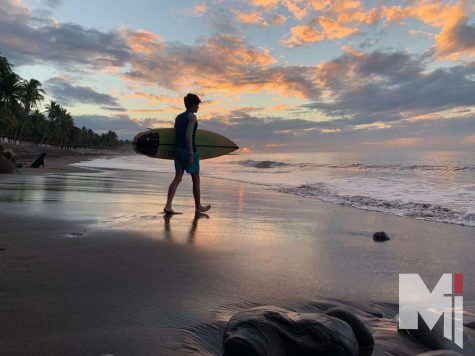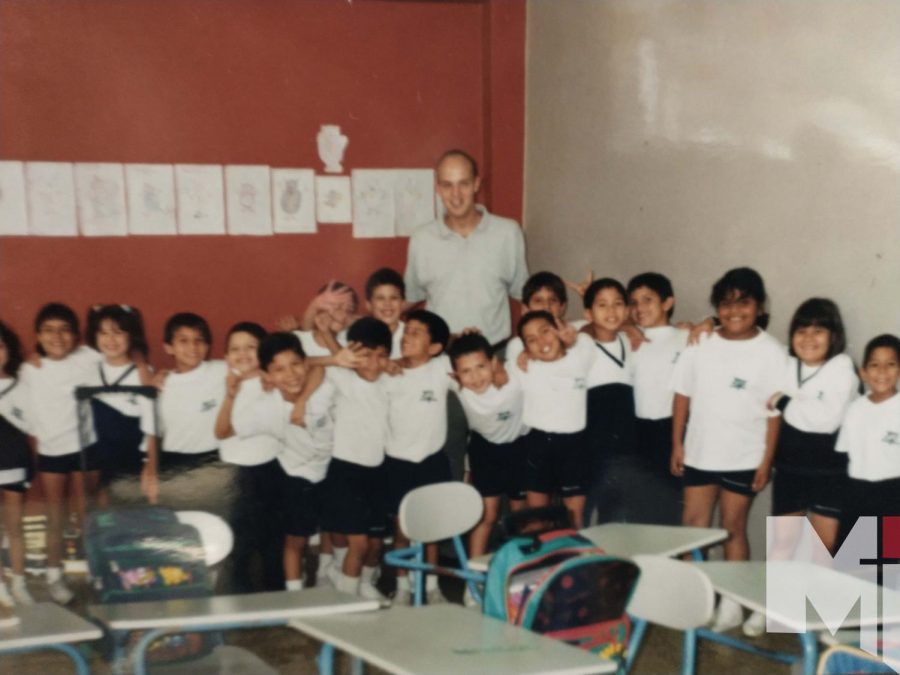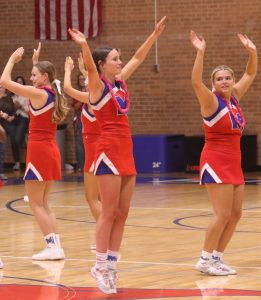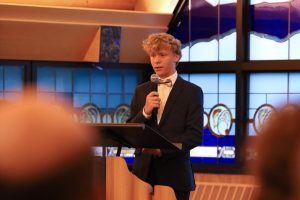Exchanging Countries: Community shares experiences of living abroad
December 9, 2021
Better wages, freedom and more opportunities are just a few reasons why someone might come to America.
For Miege students and staff who lived abroad, it was hard to leave behind their lives in different countries.
Senior Johny Warren was born and grew up in a village in South Vietnam and has gone back to visit multiple times. He remembers growing up and freely exploring the wilderness and said he misses the liberty of it. “When I’m over there I can wander around and go on my own adventures whenever I want through the forest, the sense of not being bound by anything,” Warren said. “You go outside a lot, most people don’t do that here, they’re stuck in offices and don’t get to experience actual nature.”
According to Warren in Vietnamese culture, family is much more important and a more focused point of everyday life than in America. Warren said, along with the food, that this is what he misses the most.

“In America, the culture is a mixture of a lot of other cultures and you can experience many different things such as food,” Warren said. “In Vietnam and now, still, we ate a lot of soups and not much meat so as a kid my meals were a lot different than they are now.”
Warren and his mom came to America because she was looking to earn better wages to support them and chasing the American dream sounded like a great opportunity.
“She saw it as a way to better herself because it’s the land where you get to accomplish your dreams,” Warren said. “It was never easy though, she had to work extremely hard to become successful.”
After living in El Salvador for the first 13 years of his life, senior Juan Pleitez moved to America with his mom which is her home country. Pleitez remembers the warm weather of El Salvador fondly but said he enjoys the people of America more.
“I like both countries for different reasons,” Pleitez said. “I’ve made more friends here but in El Salvador the weather lets me do anything, like go to the beach or to the mountains on any day. Up here I like people’s personalities more. People are more open about everything.”
The transition to America was easier for Pleitez because of his mom being an American, something that he said really helped him adapt to the new country.
“My mom’s from here so when I grew up I always knew what was going on in America,” Pleitez said. “Transitioning into school was kind of hard, but it wasn’t any different than anything my mom said.”
For freshman foreign-exchange student from China, Ella Liu, her plane trip to America came on a whim after her dad asked her if she would want to come here for school.
“I just came by myself,” Liu said. “My dad asked me one day, ‘Do you want to go to America.’ and I said yes. so now I’m here and I came on a plane by myself. In one year, I learned English, I took a test and now I live with an American family.”
Liu said she wanted to learn more about American culture, reinforce her English skills and find her interests. By coming to America, she found out that all these things are possible while also going to school and studying.
“In Chinese schools, we only study.” Liu said we have a lot of homework and don’t have much time to do things we like but in American schools, the students do not only study, and they also help us to find our interests and don’t give us that much homework.”
Humraz Sidhu lived in America for five years before moving back to India during a time of war when he was six to see many of his older relatives that still live there. For Sidhu, going between countries was easy because he had something to look forward to when traveling between each country.
“The hardest part was kind of getting used to the time changes rather than getting used to any of the culture,“ Sidhu said.
Having been to five different countries, living and working in three and spending time on a fishing boat in Alaska, art teacher Michael Long knew he wanted to travel the world when he was just a young child after receiving gifts from his grandmother.
“My Grandmother always sent me a subscription to National Geographic every year for my birthday, and I always wanted to visit the places I read about in that magazine,” Long said. “I have always been a wanderer since I was little.”
While living, working and traveling in Central and South America, Long saw a harsher kind of poverty that he previously didn’t know the people still lived in.
“Poverty and the paradox of the poor being the kindest and happiest people I have ever met were life-changing,” Long said.
Long was able to teach students in these countries and build relationships with them as a mentor to help them strive for a better future for themselves and their families.
“The respect that the students have for their education/school [is incredible],” Long said. “Students realize that education is their ticket out of poverty, and those fortunate enough to attend school take it very seriously. The wide gap between the rich and the poor was mind-blowing.”
As an American leaving to other countries, Long did the opposite of Warren and Pleitez who had come to America. He was able to meet people who were completely unfamiliar with someone who looked like him.
“When traveling among indigenous groups, people would just come up to me and stare right into my eyes sometimes; for five to ten minutes, I would have several people standing in front of me, not saying anything, just looking straight into my eyes,” Long said. “When I inquired about that, a friend told me that many have never seen people with my eye color.”
Seeing the poverty and living conditions of the people he stayed with created a new sense of how fortunate the majority of people are in America he said.
“I think that every experience and person we encounter when we travel changes us,” Long said. “The most profound change was my mindset, and realizing how fortunate I am and seeing what some people have to do to survive was a real eye-opener.”







